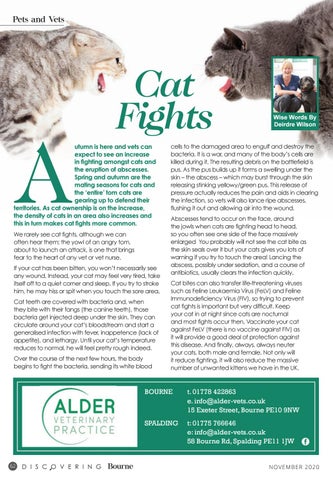Pets and Vets
A
Cat Fights
utumn is here and vets can expect to see an increase in fighting amongst cats and the eruption of abscesses. Spring and autumn are the mating seasons for cats and the ‘entire’ tom cats are gearing up to defend their territories. As cat ownership is on the increase, the density of cats in an area also increases and this in turn makes cat fights more common. We rarely see cat fights, although we can often hear them; the yowl of an angry tom, about to launch an attack, is one that brings fear to the heart of any vet or vet nurse. If your cat has been bitten, you won’t necessarily see any wound. Instead, your cat may feel very tired, take itself off to a quiet corner and sleep. If you try to stroke him, he may hiss or spit when you touch the sore area. Cat teeth are covered with bacteria and, when they bite with their fangs (the canine teeth), those bacteria get injected deep under the skin. They can circulate around your cat’s bloodstream and start a generalised infection with fever, inappetence (lack of appetite), and lethargy. Until your cat’s temperature reduces to normal, he will feel pretty rough indeed. Over the course of the next few hours, the body begins to fight the bacteria, sending its white blood
62
Bourne
Wise Words By Deirdre Wilson
cells to the damaged area to engulf and destroy the bacteria. It is a war, and many of the body’s cells are killed during it. The resulting debris on the battlefield is pus. As the pus builds up it forms a swelling under the skin – the abscess – which may burst through the skin releasing stinking yellowy/green pus. This release of pressure actually reduces the pain and aids in clearing the infection, so vets will also lance ripe abscesses, flushing it out and allowing air into the wound. Abscesses tend to occur on the face, around the jowls when cats are fighting head to head, so you often see one side of the face massively enlarged You probably will not see the cat bite as the skin seals over it but your cats gives you lots of warning if you try to touch the area! Lancing the abscess, possibly under sedation, and a course of antibiotics, usually clears the infection quickly. Cat bites can also transfer life-threatening viruses such as Feline Leukaemia Virus (FeLV) and Feline Immunodeficiency Virus (FIV), so trying to prevent cat fights is important but very difficult. Keep your cat in at night since cats are nocturnal and most fights occur then. Vaccinate your cat against FeLV (there is no vaccine against FIV) as it will provide a good deal of protection against this disease. And finally, always, always neuter your cats, both male and female. Not only will it reduce fighting, it will also reduce the massive number of unwanted kittens we have in the UK.
BOURNE
t. 01778 422863 e. info@alder-vets.co.uk 15 Exeter Street, Bourne PE10 9NW
SPALDING
t: 01775 766646 e: info@alder-vets.co.uk 58 Bourne Rd, Spalding PE11 1JW
N OV E M BE R 2 0 2 0
